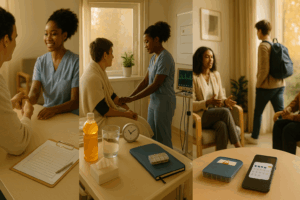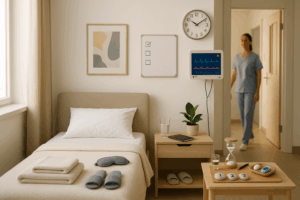A typical day in residential treatment is meticulously structured to foster both individual growth and community engagement. It commences at 7:00 AM with a routine emphasizing mindfulness through meditation, followed by a nutritious breakfast that encourages connection among clients. The day unfolds with group therapy sessions designed to facilitate shared experiences, complemented by individual counseling that targets specific personal challenges. As evening approaches, clients engage in reflective practices aimed at processing the day’s events. Yet, the significance of these daily rituals extends beyond mere routine, revealing deeper layers of healing and transformation that warrant further exploration.
Morning Routine and Activities
A typical morning in a residential treatment program often begins around 7:00 AM, setting the tone for a day focused on recovery and personal growth. Residents rise to a structured environment designed to promote stability and routine, which are essential for healing. The morning often commences with meditation practices, allowing individuals to center themselves and cultivate mindfulness. This practice can notably contribute to emotional regulation and a deeper understanding of personal triggers.
Following meditation, residents are encouraged to partake in healthy breakfasts, which are thoughtfully prepared to nourish both body and mind. A balanced meal provides essential nutrients that support physical health and help combat the effects of substance use. Breakfasts typically include whole grains, fruits, and proteins, fostering energy and clarity for the day ahead. This initial part of the day serves not only to rejuvenate the body but also to reinforce a sense of community among residents. For more on how specialized programs can support structured healing, visit this page about youth residential treatment.
Group Therapy Sessions
How do group therapy sessions contribute to the recovery process in a residential treatment program? These sessions play a significant role in fostering a supportive environment where individuals can share their experiences and challenges. Participants engage in open discussions, allowing them to express emotions and gain insights from others facing similar struggles. This shared vulnerability cultivates trust and understanding, vital components of the recovery journey. Group therapy also emphasizes the importance of peer connections.
By interacting with others who are maneuvering through the complexities of addiction, individuals can develop meaningful relationships that reinforce their commitment to sobriety. The collective wisdom of the group serves as a powerful tool, providing diverse perspectives and strategies for coping with triggers and cravings. Moreover, group sessions facilitate accountability. As participants witness each other’s growth, they are inspired to remain dedicated to their recovery goals.
Individual Counseling Time
Individual counseling time is a critical component of the recovery process in residential treatment programs, offering personalized support tailored to each individual’s unique journey. During these sessions, clients work one-on-one with licensed therapists who employ various therapeutic techniques to address specific challenges and foster personal growth. This individualized approach allows for a deeper exploration of the underlying issues contributing to substance use. You can learn more about the individualized approaches offered in our Intensive Outpatient Program.
Therapists guide clients in setting and refining individual goals, focusing on both short-term achievements and long-term ambitions. These goals may include strategies for coping with triggers, enhancing emotional regulation, or developing healthier relationships. Furthermore, individual counseling time often incorporates evidence-based practices such as cognitive-behavioral therapy (CBT) and motivational interviewing. Ultimately, this focused time fosters a sense of trust and safety, essential for effective healing and sustained recovery.
Evening Reflection and Relaxation
Following the focused and transformative experience of individual counseling, the evening reflection and relaxation period serves as an essential opportunity for clients to process their day. This structured time encourages participants to engage in evening mindfulness, allowing them to reflect on their thoughts, feelings, and experiences. By fostering a calm environment, clients can better understand their emotional landscape and the progress they have made throughout the day.
During this period, individuals are often encouraged to explore creative expression through various mediums, such as writing, art, or music. Engaging in these activities not only promotes relaxation but also serves as a therapeutic outlet for processing complex emotions associated with addiction and recovery. Moreover, evening reflection allows clients to set intentions for the following day, reinforcing their commitment to recovery.

Final Thoughts
In residential treatment, the structured daily routine fosters a supportive environment conducive to healing and personal growth. Morning activities promote mindfulness, while group therapy sessions facilitate shared experiences among peers, reinforcing commitment to sobriety. Individual counseling allows for tailored interventions addressing unique challenges. Evening reflection serves as an essential practice for processing daily experiences and setting intentions for the future. Collectively, these elements cultivate resilience and a strong foundation for sustained recovery.
If you or a loved one is struggling with addiction, remember that you don’t have to navigate this journey alone. At BlueCrest Recovery, we’re here to provide the support and resources needed to help you move from a place of powerlessness to one of strength and healing. Don’t hesitate to reach out to our team online or call us today. Let us walk with you on your journey to recovery. Follow us on Facebook for ongoing insights, encouragement, and support.
Frequently Asked Questions
What Should I Bring to Residential Treatment?
When preparing for residential treatment, it’s crucial to focus on packing essentials that support your recovery journey. Consider bringing comfortable clothing, personal hygiene products, and any necessary medications. Additionally, therapeutic items such as journals, books, or art supplies can facilitate self-expression and reflection. It’s important to check with the facility for specific guidelines on allowed items, ensuring a smooth changeover into a supportive environment that fosters healing and growth.
How Long Does Residential Treatment Usually Last?
Residential treatment duration typically ranges from 28 days to 90 days, though some programs may extend beyond this timeframe based on individual needs and progress. The structured program is designed to provide thorough support, combining therapy, education, and skill-building to address substance use disorders effectively. Each patient’s treatment duration is determined collaboratively, ensuring that it aligns with their personal recovery goals and the complexities of their addiction, fostering a tailored approach to healing. For further information on the services offered by residential treatment programs, you can review this Government Accountability Office report.
Are Family Visits Allowed During Treatment?
Family involvement can greatly enhance the recovery process during treatment for substance abuse. Many residential programs do allow family visits, although visit frequency may vary based on the facility’s policies and the therapeutic schedule. These visits are structured to promote healthy communication and support, fostering a sense of connection and stability for the individual in treatment. It is essential to consult with the specific program to understand their guidelines regarding family participation.
What Types of Meals Are Provided?
In residential treatment programs, meal variety is carefully planned to guarantee that all participants receive balanced nutrition while accommodating dietary restrictions. Meals typically include a range of healthy options, focusing on whole foods, fruits, and vegetables. Programs often take into account individual dietary needs, such as allergies or specific health conditions, to promote overall well-being. This attention to nutrition supports recovery, fostering not only physical health but also enhancing mental clarity during treatment.
Will I Have Access to My Phone or Internet?
In many residential treatment programs, technology restrictions are implemented to foster a focused recovery environment. Communication policies typically limit access to phones and the internet, especially during the initial stages of treatment. This approach encourages patients to engage fully in therapeutic activities and build interpersonal relationships without external distractions. While these restrictions may feel challenging, they ultimately serve to enhance the recovery experience and support long-term sobriety by promoting mindfulness and self-reflection.




















